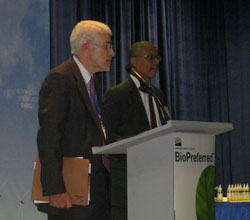 One question that continues to be asked in regard to corn ethanol production is how it will affect the global supply of food for both humans and animals. It was a primary topic of discussion at the Advancing Renewable Energy Conference last week in St. Louis.
One question that continues to be asked in regard to corn ethanol production is how it will affect the global supply of food for both humans and animals. It was a primary topic of discussion at the Advancing Renewable Energy Conference last week in St. Louis.
During a press conference, US Department of Agriculture chief economist Keith Collins was asked to address the concerns of livestock producers. Collins noted that USDA will do everything it can “to ensure that our food, feed and fiber needs in the United States are met.”
He said that some increase in corn prices can be tolerated by livestock producers and whether corn will get too expensive depends on several factors, “the pressure on bringing land into production, the kind of yield increases that we can get in corn over the next few years, and it also depends upon what we can do with our co-product feeds.”
Collins says that while 30 percent of each bushel of corn used to make ethanol comes back out as livestock feed. The problem is utilizing that more effectively by improving the quality and distribution of those co-products. But he admits that there will be competition between livestock feed and ethanol in areas where there is a large concentration of ethanol plants.
Listen to Collins’ full remarks:  Collins (2 min MP3)
Collins (2 min MP3)

